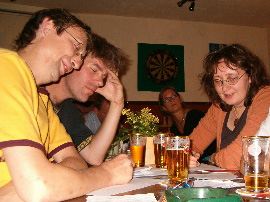Index of drinking establishment–related articles
(Redirected from List of public house topics)
Index of Drinking Establishment–Related Articles[edit | edit source]
The Index of Drinking Establishment–Related Articles is a comprehensive guide to topics related to places where alcoholic beverages are served. These establishments vary widely in their offerings, atmosphere, and cultural significance. This index serves as a resource for understanding the diverse types of drinking venues, their history, and their role in society.
Types of Drinking Establishments[edit | edit source]
Pubs[edit | edit source]
A pub, short for "public house," is a drinking establishment fundamental to British culture. Pubs are known for their cozy atmosphere, traditional ales, and hearty food. They often serve as community gathering places.
Bars[edit | edit source]
A bar is a venue where alcoholic beverages are served. Bars can range from casual neighborhood spots to upscale cocktail lounges. They are characterized by a counter where drinks are prepared and served by bartenders.
Taverns[edit | edit source]
A tavern is similar to a pub but historically served as an inn for travelers. Taverns have been central to social life in many cultures, offering food, drink, and lodging.
Beer Halls[edit | edit source]
A beer hall is a large pub-like establishment that serves beer and food. Originating in Germany, beer halls are known for their communal tables and lively atmosphere.
Cantinas[edit | edit source]
A cantina is a type of bar popular in Latin America, particularly Mexico. Cantinas are informal and often serve traditional food alongside drinks.
Nightclubs[edit | edit source]
A nightclub is a venue that operates late into the night, offering music, dancing, and drinks. Nightclubs are often associated with DJs and live performances.
Wine Bars[edit | edit source]
A wine bar specializes in serving wine rather than beer or spirits. These establishments often offer a curated selection of wines and may provide tasting events.
Cocktail Lounges[edit | edit source]
A cocktail lounge is a sophisticated bar that focuses on serving cocktails. These lounges often feature a relaxed atmosphere and skilled mixologists.
Cultural and Social Aspects[edit | edit source]
Drinking establishments play a significant role in social interaction and cultural expression. They are places where people gather to relax, celebrate, and socialize. The design and atmosphere of these venues can vary greatly, reflecting local customs and traditions.
Pub Quizzes[edit | edit source]
Pub quizzes are a popular social activity in many pubs, where teams compete to answer trivia questions. This tradition fosters community spirit and friendly competition.
Longest Bars[edit | edit source]
Some bars are famous for their length, such as the one in Mildura, Australia, which claims to be the longest in the world. These bars often become tourist attractions in their own right.
Related Pages[edit | edit source]
Search WikiMD
Ad.Tired of being Overweight? Try W8MD's physician weight loss program.
Semaglutide (Ozempic / Wegovy and Tirzepatide (Mounjaro / Zepbound) available.
Advertise on WikiMD
|
WikiMD's Wellness Encyclopedia |
| Let Food Be Thy Medicine Medicine Thy Food - Hippocrates |
Translate this page: - East Asian
中文,
日本,
한국어,
South Asian
हिन्दी,
தமிழ்,
తెలుగు,
Urdu,
ಕನ್ನಡ,
Southeast Asian
Indonesian,
Vietnamese,
Thai,
မြန်မာဘာသာ,
বাংলা
European
español,
Deutsch,
français,
Greek,
português do Brasil,
polski,
română,
русский,
Nederlands,
norsk,
svenska,
suomi,
Italian
Middle Eastern & African
عربى,
Turkish,
Persian,
Hebrew,
Afrikaans,
isiZulu,
Kiswahili,
Other
Bulgarian,
Hungarian,
Czech,
Swedish,
മലയാളം,
मराठी,
ਪੰਜਾਬੀ,
ગુજરાતી,
Portuguese,
Ukrainian
Medical Disclaimer: WikiMD is not a substitute for professional medical advice. The information on WikiMD is provided as an information resource only, may be incorrect, outdated or misleading, and is not to be used or relied on for any diagnostic or treatment purposes. Please consult your health care provider before making any healthcare decisions or for guidance about a specific medical condition. WikiMD expressly disclaims responsibility, and shall have no liability, for any damages, loss, injury, or liability whatsoever suffered as a result of your reliance on the information contained in this site. By visiting this site you agree to the foregoing terms and conditions, which may from time to time be changed or supplemented by WikiMD. If you do not agree to the foregoing terms and conditions, you should not enter or use this site. See full disclaimer.
Credits:Most images are courtesy of Wikimedia commons, and templates, categories Wikipedia, licensed under CC BY SA or similar.
Contributors: Prab R. Tumpati, MD






